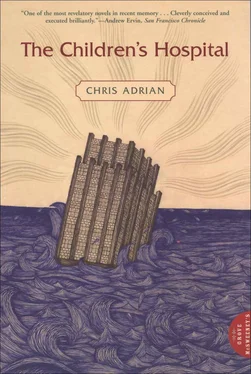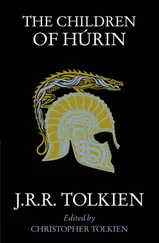“They’re wireless,” she said of them, and handed similar pairs to Jemma and Rob. “We can all see the same thing.” A few fine wisps of hair were waving in the air above her head, attracted to the antenna. Jemma put on her glasses and saw footprints laid out everywhere over the carpet and the walls.
“I’m not sure this is going to help,” she said, because she had no idea which prints to follow, and none of them seemed necessarily to be headed anywhere. “Are these all supposed to be his?”
“Not just supposed,” said Ethel. “They are his. They’re everywhere. You should see the NICU. He really got around.”
“It’ll take days just to sort through these,” Rob said.
“Hold on,” said Ethel, fiddling at her strap. Looking closer Jemma saw that what she had at first thought were decorative studs were actually adjustment knobs. As Ethel pushed and twisted them the prints became colored. Looking at one on the wall she saw it go green and red and blue and violet. “I just need to… It’s harder than it looks. You’d think she’d make it easier, like it could just work, but she always has to put on fancy tuners and counter-intuitive control buttons. By the time you figure it out you don’t need the fucking thing anymore. There. Hold on… There!” Jemma’s confusion was not lessened when the colors settled, blue and green and purple, yellow and orange and red. There were still footprints everywhere, and Jemma could not begin to decide how to divide them.
“Can you tell which ones are new?” Rob asked.
“Red ones are newest, yellow ones are second newest,” said Ethel. “Everything else we should ignore — they’re just noise but I can’t make them go away. She said I could filter them out but this thing is driving me crazy already so this is good enough, okay?”
“Okay,” said Jemma, already trying to pick out the bright red prints from all the others. There was a set curving over the banister and along the floor. She pointed at them and said, “There.”
They made for a curious sight, even in a hospital jaded with wonders, and busy again with miserable distractions. They went in a row, Ethel in the front, their heads down, picking out red prints from the jumble, too intent to notice or care when they walked in a circle or a spiral. The trail went through the PICU, pausing by Dr. Pudding’s bed and passing beneath Dr. Walnut’s, out onto the ramp where the footprints appeared as often on the railing as on the ground. Onto the sixth floor, in and out of every room down the south hall and up the north, past empty classrooms hung with old signs canceling class after class. “He really got around,” Rob kept saying.
They went into the stairwell, where the flight between the fifth and sixth floors was painted with congruent prints, entirely covered except in a few spots where a cool bit of green or blue peeked through the fresh red, and Jemma could only see the pale gray concrete when she looked over the top edge of her glasses. She imagined him pacing up and down the stairs, thinking of his brother, or playing a game with his brother’s spirit, chasing it up and down the stairs, gleefully and despairingly. A set of solitary prints emerged from the far end, skipping the sixth and seventh floor and passing through the door to the eighth.
“What are you doing?” asked Wayne, falling into step with them as they passed down the hall into the old one ward.
“Looking for somebody,” said Ethel.
“You look like you lost a quarter.”
“You look like you’re about to become a pain in my ass,” said Ethel.
“I was just offering an observation.”
“Shouldn’t you be on the ward?” asked Rob.
“I’m on a break. Do you need help?”
“It’s probably already less than a three-person job,” said Jemma. They paused before the monument to Dr. Sashay. It was not so well tended as it had used to be. The flowers were perpetual, and the little glitter fountain never needed new batteries, but there was a layer of dust on her Hello, Dolly shoes, and a smear of grease on her big portrait. The prints became irregular around it, spaced wide and close, with more than a few on the wall, and there was a smudge on the portrait that looked to Jemma as if he had touched his nose to her nose.
“It looks like he was dancing,” said Ethel.
“Who?” asked Wayne.
“Somebody,” said Ethel, moving on. Wayne trailed after them until they got out to the ramp, where he paused by the archway.
“You sure you don’t need some help?” he asked.
“Go back to work,” said Ethel, “or we’ll report you.”
“I’ll report you,” he said confidently, but he didn’t follow them up the ramp. On the ninth floor the prints became irregular again, running in quick bursts toward one wall, then away from it and up another. They returned to the center of the hall and then became more widely spaced. “Now he’s running,” Rob said.
“Or hopping,” said Ethel. “He liked to hop.” The prints went back to the ramp and up to the roof, not dilly-dallying in front of Thelma’s monument, a pair of arms that came out of the wall and hugged you if you stood between them. They leaped over her old desk and paused — there were five or six pairs in the room. Jemma could see him stopping and turning and looking back.
“Somebody was chasing him!” she said, just as she realized it.
“No shit,” said Ethel, hurrying up the stairs. She and Rob ran, Jemma followed at a jazzy waddle, not caring how stupid she looked, suddenly excited and afraid. On the roof the prints were cast about everywhere, laid upon the top of the grass and the sides of the tree, around the bushes and in the greenhouse. A set stood just by the swing set, and then the nearest set was fifty feet away at the edge of the soccer field. In many places it was obvious that he had fallen down; the prints were smeared. The three searchers split up, each of them hurrying to different sections of the roof, ignoring the stares they drew. There were mysteries to unravel in every corner: here he hid under a bench, here he rolled on the ground, here someone might have picked him up.
The three of them met again in the middle, all of them confused by what they saw: he had been everywhere on the roof, and yet no prints led back to the stairs, or down the ramp, or to the elevator. They spent another half hour looking for trap doors in the grass, and doorways in the trees, before Ethel cursed again and began to mess with her buttons. The prints appeared and disappeared, and then sprang into motion, stepping over each other and on top of each other, moving so fast they made Jemma dizzy. “God fucking dammit,” Ethel said. She went up to a replicator and gave it a kick. “I just want the last ones,” she said. “Is that so hard? The very last ones of all!” Jemma couldn’t hear the angel’s reply, but another pair of glasses came sliding out of the mist. Ethel threw hers down and put on the new ones, then peered hither and thither all over the roof. Her gaze fixed past Jemma, toward the ledge where she and Ishmael had been fishing six months before.
“Oh, fuck,” she said. “No way. No fucking way!” She threw off the glasses and ran to the replicator, kicking it over and over while the angel cautioned her loudly not to hurt her foot. Rob picked up the glasses, looked once, shook his head, then handed them to Jemma. She put them on and saw what they had, the whole roof empty of prints except for a pair right at the edge, the left one cut off at the toes by the edge. She looked harder, elsewhere, trying to call them out of the green grass or the gray slate of the garden paths, but there were none. She looked again at the pair on the ledge, and noticed how they were smeared a little at the edges, like someone had pushed him, and raised her eyes to the endless ocean and the distant horizon, blue on blue, quiet and deep.
Читать дальше












